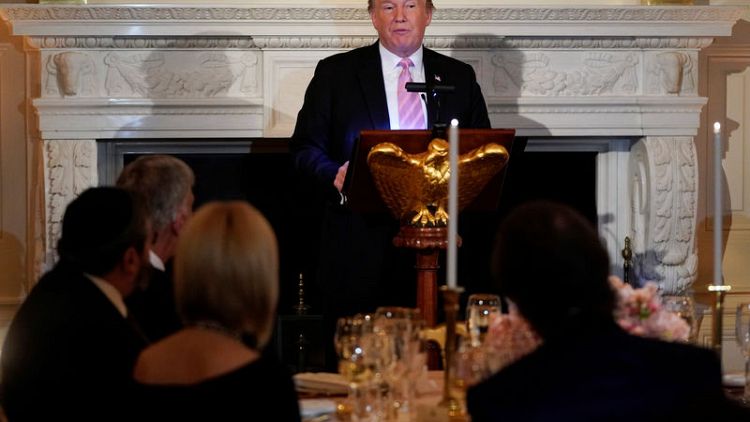By Jan Wolfe
(Reuters) - Like numerous U.S. presidents before him, Donald Trump could cite the legal doctrine of "executive privilege" to try to block congressional investigators from getting access to certain documents and witnesses they are seeking.
Trump is stonewalling Congress on multiple probes of himself, his presidency and his businesses, blasting them as "presidential harassment." In an unusual move, he is even suing to stop the release of some materials that lawmakers want.
Here is how executive privilege works and how useful it might be to Trump as the investigations close in on him.
WHAT IS EXECUTIVE PRIVILEGE?
Executive privilege is a legal principle that allows the president to refuse to comply with demands for information like congressional subpoenas or Freedom of Information Act requests.
The doctrine is generally used to keep private the nature of conversations the president has with advisers, or internal discussions among executive branch officials.
The idea is that the White House operates more effectively if the president and his aides can have private, candid conversations, without worrying about public scrutiny.
WHERE DOES THE DOCTRINE COME FROM?
Executive privilege is not explicitly mentioned anywhere in the Constitution, the foundation of U.S. law.
But the Supreme Court has said that it is “fundamental to the operation of government and inextricably rooted in the separation of powers under the Constitution.”
Its first use may have been President Thomas Jefferson’s refusal to provide evidence in a treason prosecution against his former vice president Aaron Burr. In the end, a judge ordered Jefferson to produce the evidence, which Burr said would exonerate him, and Burr was acquitted.
The term "executive privilege" was not used until the 1950s. The doctrine's contours were unclear until a 1974 Supreme Court case. In U.S. v. Nixon, President Richard Nixon was ordered to deliver tapes and other subpoenaed materials to a federal judge for review. The justices ruled 9-0 that a president's right to privacy in his communications must be balanced against Congress' need to investigate and oversee the executive branch.
U.S. v. Nixon is also widely understood to mean that executive privilege cannot be used to cover up wrongdoing. That view was endorsed by current U.S. Attorney General William Barr during his Senate confirmation hearing.
One lesson of U.S. v. Nixon is that an executive privilege claim is particularly weak when Congress has invoked its power to remove a president from office through impeachment, said Frank Bowman, a law professor at the University of Missouri.
In the impeachment context, "virtually no part of a president’s duties or behaviour is exempt from scrutiny," Bowman said.
Presidents George W. Bush, Bill Clinton, and Barack Obama all invoked executive privilege in response to congressional investigations. But compared with previous presidents, recent ones have hesitated to claim executive privilege, in part because of how Nixon used it, said Mitchel Sollenberger, a politics professor at the University of Michigan-Dearborn.
"Once you do an executive privilege claim, it becomes a politically charged event," Sollenberger said. "The media sees that, and it flares up quickly."
CAN TRUMP USE EXECUTIVE PRIVILEGE TO BLOCK MCGAHN'S TESTIMONY?
Legal experts said that conversations between a president and the White House counsel were exactly the sort of thing that executive privilege is intended to keep private.
On the other hand, a strong argument could be made that Trump long ago forfeited, or waived, his right to make an executive privilege claim over his conversations with Don McGahn, said Michael Stern, a former congressional lawyer in Washington.
Much like the attorney-client privilege, executive privilege is intended to keep conversations private. Generally speaking, once third parties are told about such conversations, they are no longer secret and the privilege has been waived, legal experts said.
McGahn, then the White House counsel, was allowed to sit for several interviews with Special Counsel Robert Mueller's team and McGahn's testimony was cited 157 times in Mueller's 448-page report on Russian interference in the 2016 U.S. election and Trump's attempts to impede that inquiry. That means any executive privilege claim has likely been waived, Stern said.
Other lawyers have argued that making McGahn available for interviews was not a total waiver. They said Trump could still invoke the doctrine to limit some of McGahn's testimony.
Barr seemed to endorse that view during a Senate hearing on Wednesday, saying: "We haven't waived his privilege."
HOW DOES CONGRESS COMBAT AN EXECUTIVE PRIVILEGE CLAIM?
If McGahn, whose departure from the White House was announced by Trump in August 2018, refuses to testify, Congress could vote to hold him "in contempt of Congress" and then go to court and ask a judge to issue an order forcing him to comply. The judge would then decide the merits of an executive privilege claim.
(Reporting by Jan Wolfe in Washington; Editing by Kevin Drawbaugh and Peter Cooney)
